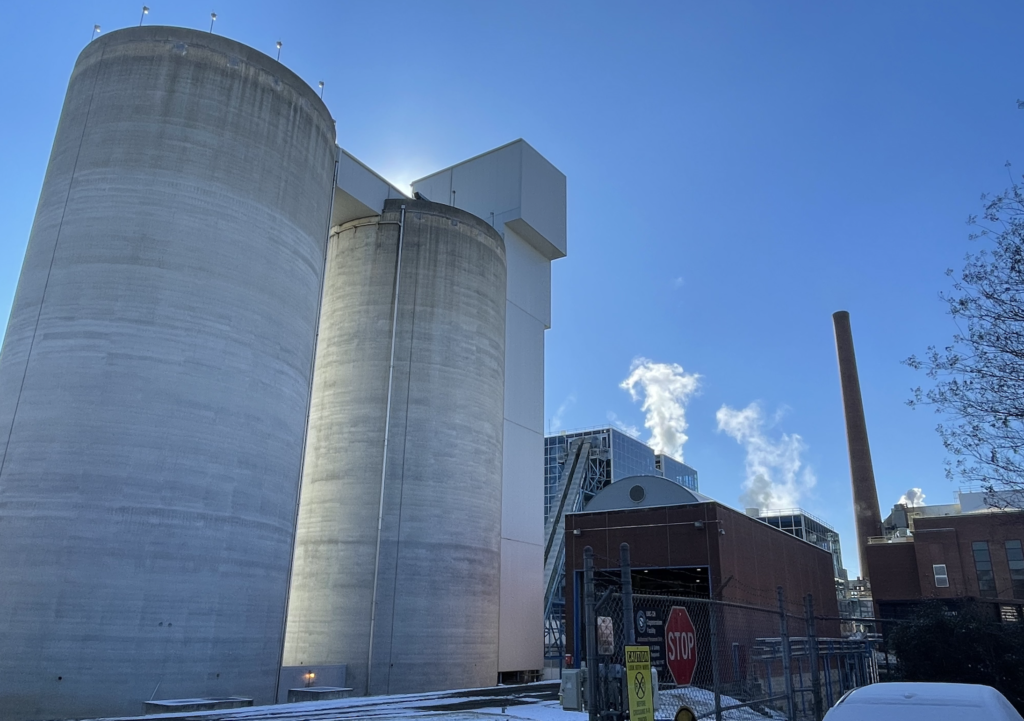Dozens of community members expressed frustration and disapproval at Thursday’s public hearing on a proposed modification to UNC-Chapel Hill’s air quality permit. The modification would add engineered fuel pellets to a list of resources that the university can burn in its cogeneration plant, which produces steam and electricity that powers the campus.
The plant, which sits on Cameron Avenue in the middle of a residential area, currently burns mainly coal and natural gas. The fuel pellets that would be added by this modification are engineered by Convergen Energy, a Wisconsin-based company, out of plastic and paper waste. They contain perfluoroalkyl and polyfluoroalkyl substances, known as PFAS, which are known to accumulate in the environment and in the human body.

UNC Cogeneration Facility on Cameron Avenue.
The hearing was hosted by the North Carolina Department of Environmental Quality’s Division of Air Quality and was held in the Chapel Hill Town Hall. The hearing officer was Melinda Wolanin, regional supervisor from the Division of Air Quality’s Mooresville Regional Office. She was joined at the desk by director of public affairs Sam Chan and environmental justice coordinators Corey Williams and Paige Azzarita from the DEQ, as well as deputy director Taylor Hartsfield, public information officer Shawn Taylor, and permitting section chief Mark Cuilla from the DAQ.
Nearly every seat in the room was occupied, and even the overflow room began to fill up. Speakers gave three-minute speeches one after another for more than two and a half hours.
While the speakers varied widely in tone and reasoning, they all spoke against the plant and voiced concerns over its effects on the local environment and the residents of nearby communities.
“I’m just so angry that these pellets are even being considered. It’s so sad that this technology is what we are turning to now,” said Chapel Hill High School junior Lucy Safir. “I might die from cancer because of these emissions or whatever else is going to come up in my future.”
Other speakers such as Susannah Tuttle, a former UNC sustainability researcher who participated in the university’s effort to find alternate fuel sources for the plant over 20 years ago, acknowledged that the plant’s reliance on coal must be addressed, but were skeptical that plastics containing PFAS are at all better.
“I am both shocked and saddened,” she said. “Although UNC is finally, decades later, proposing a pathway to transition away from coal that risks doing significant harm, burning a pellet made from pre-consumer industrial paper and plastic waste products should not be considered an acceptable fuel source alternative, and it certainly should not fit into a climate action plan designed for the 21st century.”
Madeleine Wares was among several speakers who referenced how natural disasters are exacerbated by human behavior, specifically referring to recent events.
“With the hurricane that devastated western North Carolina last year, as well as the wildfires in LA, UNC should stand as a beacon of climate justice and sustainability, not as a model of environmental discrimination and greenwashing,” she said.
The issue of environmental discrimination was also frequently discussed, as several speakers, including UNC doctoral student Kristen Cowan, pointed out that the plant disproportionately affects minority-heavy communities.
“This is an environmental justice issue, with the burning being situated near two historically Black neighborhoods within just one mile of the plant,” she said. “This is a harm that has persisted with the coal plant due to the acceptance of environmental racism in our community.”
Matthew Spaulding, a former air quality consultant at Ramboll Environ, was the only speaker who specifically acknowledged the impossibility of shutting down the plant and the real difficulty of finding good alternative fuel options.
“While I would love to see UNC move towards greater solutions and renewable energy sources, I can appreciate the financial reality and how hard that is,” he said. “Having worked in air quality, I have a lot of faith in the permitting process, and I have a lot of faith in you, the people who will ultimately guide us to this decision.”
In a statement provided by UNC Media Relations, the university said that it will have more data available after it completes testing of the alternative fuel, and that more information can be found on its energy services website.
“We continue to explore and test new technologies and fuel options as they come to market for UNC-Chapel Hill’s cogeneration facility,” the statement read. “This latest permit modification request to test engineered fuel pellets from Convergen Energy is one step in this process.”
The comment period for this draft permit will close on Thursday, after which the Department of Environmental Quality will weigh the public comment with UNC’s request. You can submit comments by emailing daq.publiccomments@deq.nc.gov or leaving a voicemail at (919) 707-8448.
Chapelboro.com does not charge subscription fees, and you can directly support our efforts in local journalism here. Want more of what you see on Chapelboro? Let us bring free local news and community information to you by signing up for our newsletter.
Related Stories


